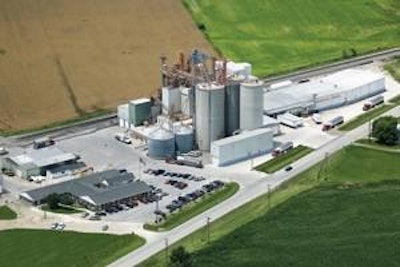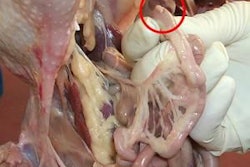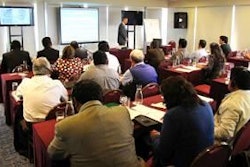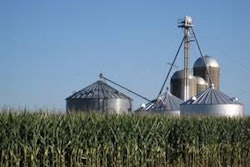
Paul Kalmbach is the president of Kalmbach Feeds, a second-generation nutrition company located in Upper Sandusky, Ohio. The company was established by his father the late Milton P. Kalmbach in 1963 and has undergone progressive expansion with the erection of a second production facility which was commissioned in 2008 and named for the founder. Recently, Feed Management had the opportunity to discuss current industry trends from the perspective of an independent, large-scale operation.
Feed Management: Please describe the history of your company and your personal involvement.
Paul Kalmbach: My late Father, Milton Kalmbach, a nutritionist with degrees from Pennsylvania State University and the University of Connecticut, served in the cooperative system in Ohio. He established our feed manufacturing company in an old, remodeled (by him) feed dealership in 1963.
I worked in the mill as a high school student, through college and entered the business in 1979 after graduating from The Ohio State University. My involvement with aspects of production really started in 1970 and involved every function in the operation from sweeping the floor as a teenager through formulation, operating milling equipment and selling and delivering feed.
FM: What range of products does Kalmbach Feeds produce?
PK: We manufacture a complete line of nutritional products for all species. We also have a complete range of performance equine feeds and specialty products including diets for mink, wildlife and pets. We manufacture under private label in addition to branded items. Kalmbach Feeds distributes over a 500-mile radius and our specialty feeds are shipped to customers, distribution centers and warehouses east of the Mississippi.
FM: What are major challenges facing the feed industry today?
PK: A critical problem we are facing is diversion of corn to ethanol. The misplaced government mandate distorts production economics, impacts profitability of producers with the cost ultimately borne by consumers. In decades to come we will look back on this unwarranted exercise as a transfer of wealth from taxpayers to ethanol producers and some crop farmers with drastic, unfair, and unintended consequences in the entire livestock sector.
Another critical issue which is of concern is the growing influence of the vegan movement which has incorporated aspects of environmentalism and animal welfare to support an agenda which will radically change the way we produce and consume food. The impact on animal agriculture is a concern since so much political capital, goodwill, financial resources and time are being expended to oppose a small but vociferous minority.
FM: Do you have other concerns?
PK: I’m worried about the growing involvement of regulatory agencies such as the EPA, FDA, OSHA and components of the USDA on our daily activities. The present administration has developed well-meaning but frequently impractical policies which will be difficult and very costly to implement. Despite their legal backgrounds many of our newly minted administrators and lower-level political appointees are unaware of the Law of Unintended Consequences even when these consequences are quite obvious.
FM: What are some the contributors to the success of Kalmbach Feeds?
PK: We work for our customers, most of which are family operations. We believe the customer is always right because the customer is always the customer. We do not want to do anything to damage the trust we have with our customers.
Additionally, across a wide range of customers, we have been able to bring better solutions and a better value for many years.
FM: Kalmbach Feeds is known for innovation. How do you develop new products?
PK: Our company was founded by a nutritionist and the scientific tradition has followed for nearly 50 years. We develop new products, processes, and value propositions in response to the needs of our customers. Sometimes these needs are laid out before us perfectly and sometimes they are very conceptual. Once we understand the objectives or needs of our customers, we go to work to accomplish the changes, research, or products that are needed.
This has resulted in patented products, proprietary products, and new production processes that are completely unique to our company. Additionally, we are members of a proprietary, international research organization called Cooperative Research Farms and we conduct significant research on our own in addition to the research done at universities.
Our newest facility, the Milton P. Kalmbach Mill, is based largely upon European concepts in order to be able to produce salmonella-free products. Innovations, adaptation, and value for our customers are alive and well in our company.
FM: How do you view consolidation within the livestock industry?
PK: Consolidation may be inevitable as it reflects economic realities. This said, there is a danger that the good relationship between producers and our consumer customers may be affected to the detriment of both. There was a period during the late ‘70s when conglomerates were the fashion. Many of these organizations were subsequently dismembered since they were impractical. Many organizations become simply too large to manage efficiently especially when they lose contact with their clients and constituencies.
I believe that it is easy for a large company or conglomerate to lose contact with their customers. I personally favor diversity and I feel that with extreme concentration of production facilities there is a higher biosecurity risk, higher environmental risk, and ultimately that not even the economics will work.
FM: Where do you see Midwest livestock and poultry industries in the intermediate future?
PK: The crystal ball is becoming foggier due to the current economic and political issues. The future of both Midwest agriculture and livestock production depends on government policy with regard to ethanol and the resolution of problems created by vegan/welfare/environmental advocates. Successful companies will be able to move quickly to take advantage of changes and will be able to plan and execute projects within a short time frame.
The future of the industry will be governed in large measure by the policy of the present administration since the USDA appears to be set on some radical departures from programs which have traditionally contributed to growth and stability.
FM: How do you view the future of independent feed manufacturers in competition with integrators and multinationals?
PK: We believe that there is a sound future for well-run companies with sound balance sheets which offer service and can adapt to economic pressure. A certain level of reinvention is necessary to promote growth. A few companies have survived as toll-millers but there are fewer and fewer independents. We face competition from U. S. multinationals with subsidiaries in the U.S. as well as U.S. multinationals. Good companies providing real value will survive based upon their ability to "see the field" and adapt.

















